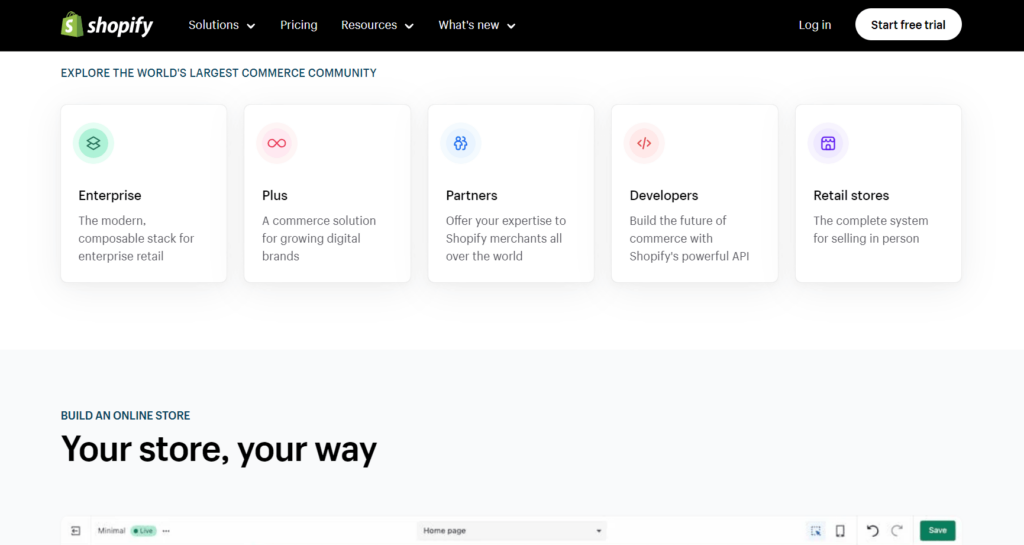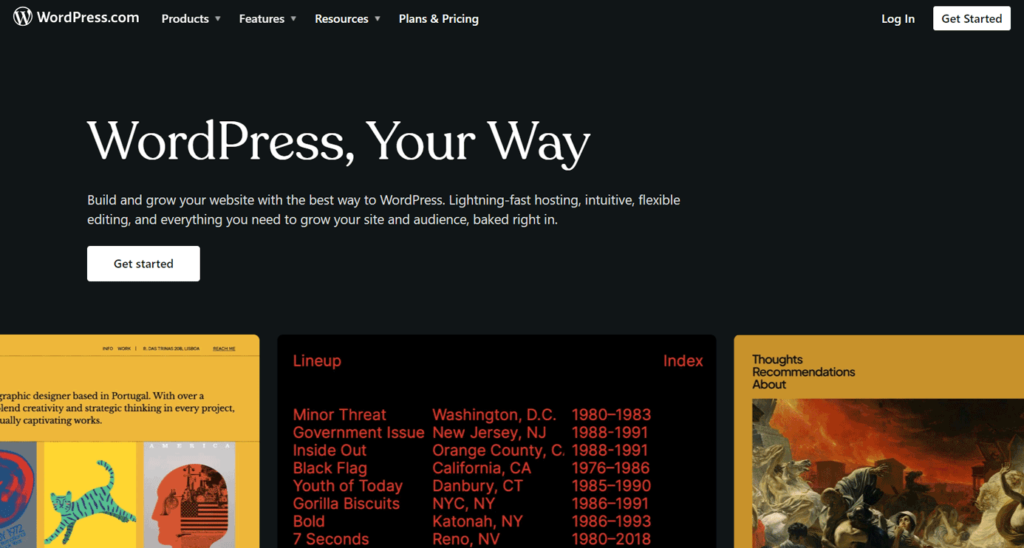Table of Contents
Our Verdict

In the debate between Shopify and WordPress for e-commerce, each platform offers distinct advantages tailored to different business needs. Shopify excels with its user-friendly interface and out-of-the-box functionality, making it an ideal choice for entrepreneurs who desire a straightforward, secure, and fully hosted solution to quickly start and scale their online stores. It’s particularly beneficial for those with limited technical skills or resources to manage web infrastructure.
On the other hand, WordPress, when integrated with WooCommerce, offers unparalleled flexibility and customization options. This makes it perfect for businesses that require a robust content management system alongside their e-commerce activities, and for those who value control over every aspect of their site, from design to functionality.
The decision between Shopify and WordPress hinges on your specific business requirements: Shopify for simplicity and ease of use, and WordPress for advanced customization and control.
Why Choose Shopify
Who Shopify Is Best For
Shopify is the ideal choice for you if you:
- Require robust security features and reliable hosting to ensure your online store operates smoothly and securely.
- Need integrated payment solutions that simplify the process of accepting payments from customers globally.
- Want to access a vast app store to extend the functionality of your store with plugins for marketing, SEO, and other essential e-commerce tools.
- Seek an easy-to-use platform to launch and manage an online store without needing advanced technical skills.
- Desire a variety of professional-looking store templates that can be customized to match your brand.
- Aim to leverage built-in tools like SEO features, marketing solutions, and detailed analytics to grow and manage your business effectively.
MORE >>> Shopify Domains: Buy It or Not?
Who Shopify Is Not Right For
Shopify may not be the ideal choice for you if you:
- Prefer full control over all aspects of your website’s hosting and technical infrastructure, as Shopify’s hosted solution limits this type of access.
- Wish to avoid a platform where certain e-commerce functionalities are locked behind higher-tier plans, necessitating upgrades as your business grows.
- Need advanced customization capabilities that require direct access to the underlying code beyond what is offered through Shopify’s theme and app marketplace.
- Require complex, large-scale enterprise solutions that might need highly customized workflows and integration capabilities beyond the typical e-commerce features.
Why Choose WordPress
Who WordPress Is Best For
WordPress is the ideal choice for you if you:
- Seek unparalleled customization and control over your website’s design and functionality.
- Desire a robust content management system that can handle not just e-commerce but also blogs, portfolios, and other types of websites.
- Need the ability to extend your site’s capabilities through a vast array of plugins and themes.
- Want to build a website with specific functionalities or integrate with third-party services that are not typically supported by simpler website builders.
- Aim to maintain full ownership and control over your website’s hosting, security, and updates.
Who WordPress Is Not Right For
WordPress may not be the ideal choice for you if you:
- Prefer a plug-and-play solution with minimal setup, as WordPress requires some technical understanding for installation and customization.
- Avoid managing your own hosting, updates, and security, which can be complex and time-consuming.
- Seek integrated e-commerce solutions without the need for additional plugins or extensive setup, unlike platforms that are specifically designed for e-commerce.
- Require immediate customer support directly from the platform provider, as WordPress does not offer centralized customer service.
- Wish to avoid the ongoing maintenance and potential compatibility issues that can arise with updates to plugins and themes.
Main Differences
Ideal For
Consider Shopify if you’re looking for an all-in-one e-commerce solution that simplifies the process of setting up and managing an online store. It’s perfect for businesses that want a quick start without needing extensive technical skills, offering user-friendly tools for inventory management, payment processing, and integrated sales channels. Shopify stands out for businesses that prioritize ease of use, robust customer support, and scalability from small startups to larger enterprises.
Opt for WordPress if you prioritize flexibility and customization in building your online presence. It’s ideal for users who have specific design and functionality needs or who plan to integrate complex content strategies alongside their e-commerce activities. WordPress, coupled with WooCommerce, offers a powerful platform for those who are tech-savvy or have access to technical resources, enabling detailed customization and a unique online store tailored to precise business requirements. This choice is particularly advantageous for businesses that require extensive content management capabilities alongside their commerce operations.
Pricing
Shopify simplifies the pricing structure into three main tiers, making it straightforward for businesses of various sizes to choose a plan that suits their needs. The Basic plan starts at $29 per month when billed annually, offering all essential e-commerce features, which is ideal for small businesses just starting out. The Shopify plan at $79 per month, billed annually, is well-suited for growing businesses looking for additional capabilities like professional reports and better rates on shipping and payment processing. For large enterprises requiring advanced reporting and analytics, the Advanced plan at $299 per month provides comprehensive tools for scaling operations.
WordPress, on the other hand, presents a cost-effective front-end with its ostensibly free CMS, but the total cost of ownership can add up due to additional expenses. Hosting costs can range from $5 to $100 per month depending on the type of hosting service (shared, VPS, dedicated, or managed WordPress hosting). While the core WordPress software is free, themes and plugins, which enhance functionality and design, can vary from free to several hundred dollars. Additionally, WordPress might require occasional technical support and maintenance, which could lead to further expenditures.
Integrations
When it comes to integrations, both Shopify and WordPress offer a wide array of options, each with its own strengths.
Shopify boasts an extensive collection of over 8,000 apps, covering everything from marketplace integrations to social media links, subscription management tools, customizable designs, and beyond. These apps serve to make your store stronger, with features like multichannel selling, product reviews, and marketing and SEO tools. Shopify’s support is also available 24/7, providing assistance whenever needed.
On the other hand, WordPress offers nearly 60,000 free plugins, although not all are specifically tailored for online stores. These plugins cover a wide range of functionalities, from product reviews to inventory management and more. WordPress’s extensibility allows for the addition of practically any feature through its vast plugin repository, making it incredibly versatile.
Standout Features
Shopify stands out with its user-friendly, all-in-one e-commerce platform designed specifically for online stores. It provides a robust set of tools including a variety of templates, built-in payment processing, and advanced inventory management, making it ideal for businesses looking for a streamlined online retail solution. Shopify’s extensive app store further enhances functionality, offering over 8,000 apps to customize and scale any aspect of your business operations.
WordPress, known for its versatility, excels as a highly customizable platform through its vast ecosystem of plugins, including WooCommerce for e-commerce functionality. This makes it perfect for those who need a tailored website with the ability to expand and incorporate complex features.
WordPress is particularly favored for its powerful content management capabilities, making it a go-to for businesses that require strong SEO performance and content marketing strategies. Additionally, its open-source nature allows for deep customization, catering to specific needs that go beyond standard e-commerce setups.
Standout Features
Shopify

- Provides robust 24/7 customer support via email, live chat, and phone, ensuring that merchants have assistance whenever needed.
- Facilitates secure payment processing with built-in tools and compliance with online payment regulations to enhance transaction safety.
- Streamlines the setup and management of online stores with an intuitive user interface that simplifies operations for users of all skill levels.
- Integrates seamlessly with a multitude of applications and services, boasting over 8,000 apps to extend the functionality of your e-commerce platform.
- Offers multiple customizable templates and themes that cater to various aesthetic preferences and business needs, allowing for personalization without the need for coding.
PRO TIPS >>> Best Ecommerce Platforms for Beginners
WordPress

- Empowers users with a large repository of over 60,000 free plugins, enhancing functionality and user experience across diverse use cases.
- Facilitates community-driven support and resources, providing users with forums, documentation, and tutorials to solve issues and optimize their websites.
- Offers flexibility in hosting options, giving users the freedom to choose their hosting provider and control over their website’s backend setup.
- Supports extensive customization options, allowing users to tailor their sites with themes, plugins, and custom coding to meet specific needs.
- Enables easy content management with its intuitive dashboard, ideal for blogs, corporate websites, and e-commerce platforms.
Pros and Cons of Shopify

Pros
- Simplifies the setup process for online stores with minimal technical expertise.
- Ensures security with PCI compliance and SSL certificates for all stores.
- Provides robust e-commerce tools, including inventory management, integrated payments, and customizable checkout.
- Supports extensive integrations with over 8,000 apps to enhance store functionality and user engagement.
- Enhances sales strategies with SEO features, marketing tools, and detailed analytics.
Cons
- Charges additional transaction fees unless using Shopify Payments, potentially increasing operational costs.
- Presents a learning curve for navigating its comprehensive feature set, particularly for those new to e-commerce.
- Imposes limitations on shipping rate calculations and advanced shipping options without integration of external apps or higher plan subscriptions.
- Limits design flexibility without custom coding or paid themes, which may constrain unique branding needs.
- Requires additional spending for many third-party apps and features, which can escalate monthly expenses.
Pros and Cons of WordPress

Pros
- Enables extensive customization through thousands of themes and plugins, allowing you to tailor your site precisely to your needs.
- Supports a wide array of content types and complex site architectures, making it ideal for sites that go beyond basic e-commerce.
- Offers a large community of users and developers, providing abundant resources, support, and updates.
- Integrates easily with numerous third-party services and platforms, enhancing functionality with plugins like WooCommerce for e-commerce.
- Allows complete control over your website’s hosting, design, functionality, and scalability.
Cons
- Requires a higher level of technical skill, especially for customization and maintaining the site’s health.
- Presents potential compatibility issues between plugins and themes, which can affect website performance and stability.
- Involves additional costs for premium plugins, themes, and hosting services, which can add up beyond the initial free software.
- Demands regular updates and maintenance to secure and optimize your site, which can be time-consuming.
- Lacks direct support from WordPress.org, relying instead on community forums and external providers for troubleshooting.
Customer Reviews
Shopify and WordPress each have their strengths as reflected in their customer reviews on platforms like TrustPilot and SiteJabber. Shopify, with a rating of 4.1 out of 5 on TrustPilot, is recognized for its user-friendly interface and robust e-commerce features, making it ideal for those seeking an easy-to-use platform for their online store.
However, it does receive some criticism regarding its customization limits and higher transaction fees. On the other hand, WordPress, rated 4.3 out of 5 on TrustPilot, is highly valued for its flexibility and extensive customization options through plugins and themes. Although it offers powerful features, it is noted for having a steeper learning curve and requiring more maintenance, which might be challenging for beginners.
GET SMARTER >>> Best eCommerce Platforms for WordPress
Competitors
Here are some alternatives to Shopify and WordPress, each offering distinct features and pricing structures suitable for various e-commerce and website needs:
BigCommerce
An all-in-one e-commerce platform similar to Shopify, BigCommerce offers extensive built-in features without the need for extensive plugins. Pricing starts at $29.95 monthly, targeting businesses looking to scale without the complexity of additional fees.
Wix
Known for its drag-and-drop website builder, Wix provides a user-friendly interface that’s great for beginners. It integrates e-commerce capabilities smoothly and offers plans starting from $23 per month, making it a good option for small to medium-sized enterprises.
Squarespace
With a strong focus on design, Squarespace is perfect for creators and small businesses that want visually appealing websites with integrated e-commerce capabilities. Pricing plans for websites with e-commerce start at $26 per month.
Pro Tips

- Leverage the user-friendly platform for ease of online store management
- Compare costs, including fees, to determine the best value
- Engage with the community for insights and troubleshooting
- Utilize SEO tools to boost website visibility and drive traffic
- Monitor performance analytics to refine strategies
Recap
When deciding between Shopify and WordPress for your online store, consider your specific business needs and technical capabilities. Shopify offers a user-friendly, all-inclusive e-commerce platform with various pricing plans that cater to businesses of all sizes, providing essential online sales tools and customer support without the need for extensive technical knowledge.
On the other hand, WordPress, with its vast customization options through plugins and themes, is ideal for those who require a highly tailored website and possess the technical skills to manage and customize a more complex system.









